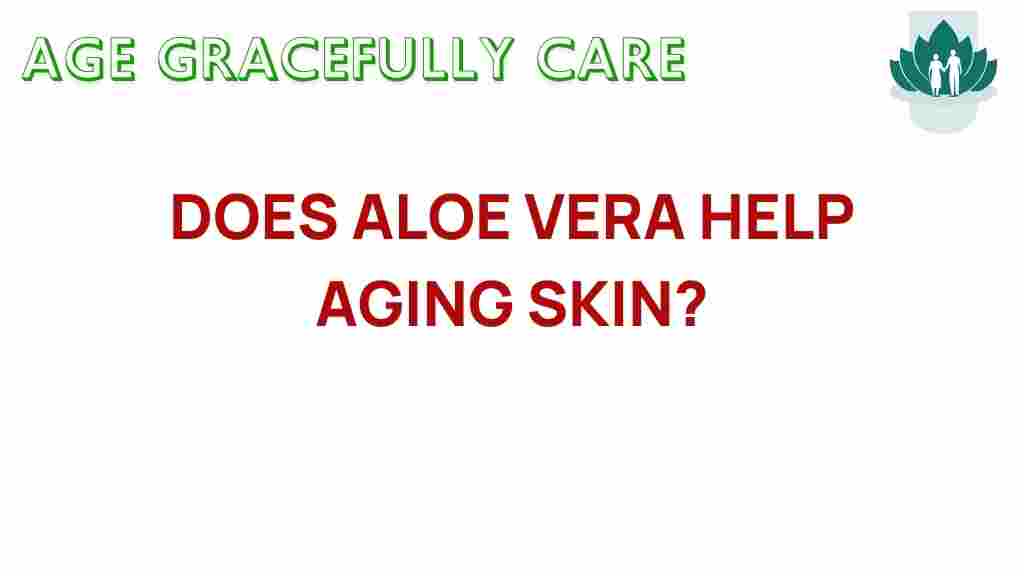Unveiling the Secrets: Does Aloe Vera Truly Combat Aging Skin?
Aging skin is a natural part of life, but the quest for maintaining a youthful appearance is as old as time itself. Enter aloe vera, a potent natural remedy celebrated for its many benefits in skincare and wellness. This succulent plant is often hailed as a miracle worker for its anti-aging properties. But does aloe vera truly combat aging skin? In this article, we will explore the science behind aloe vera, its nutrients, and how it can be integrated into your skincare routine to promote hydration and beauty.
What is Aloe Vera?
Aloe vera is a succulent plant species belonging to the genus Aloe. It consists of a gel-like substance that is extracted from its leaves and is renowned for its healing and soothing properties. This versatile plant is rich in vitamins, minerals, and antioxidants, making it a popular ingredient in skincare products focused on anti-aging and hydration.
The Nutrient Profile of Aloe Vera
Aloe vera is packed with essential nutrients that are beneficial for the skin. Here are some key components:
- Vitamins: Aloe vera contains vitamins A, C, and E, all of which are known for their antioxidant properties. These vitamins help to protect the skin from oxidative stress and promote cell regeneration.
- Minerals: Important minerals like zinc, magnesium, and calcium present in aloe vera contribute to healthy skin and may aid in the healing process.
- Amino Acids: Aloe vera contains over 20 amino acids, which are essential for repairing skin tissue and maintaining skin elasticity.
- Enzymes: The plant includes various enzymes that help exfoliate dead skin cells, promoting a smoother and healthier complexion.
How Aloe Vera Benefits Aging Skin
The benefits of aloe vera for aging skin are numerous. Here’s how it works:
1. Hydration
One of the most significant benefits of aloe vera is its ability to hydrate the skin. It acts as a natural moisturizer, penetrating deep into the skin layers without leaving a greasy residue. This hydration is crucial for aging skin, as it tends to lose moisture over time, leading to dryness and wrinkles.
2. Anti-Aging Properties
Aloe vera contains antioxidants that combat free radicals, which are responsible for skin aging. By neutralizing these harmful molecules, aloe vera helps reduce the appearance of fine lines and wrinkles, promoting a youthful glow.
3. Skin Repair
The nutrients in aloe vera aid in skin repair and regeneration. It stimulates collagen production, which is essential for maintaining skin elasticity and firmness. Regular application of aloe vera can help improve the overall texture of aging skin.
4. Soothing Irritation
Aloe vera is well-known for its soothing properties, making it an excellent choice for sensitive or irritated skin. Its anti-inflammatory effects can calm redness and puffiness, giving the skin a more even tone.
5. Natural Remedy for Dark Spots
As we age, dark spots and hyperpigmentation often become more pronounced. Aloe vera contains compounds that can help lighten these spots, leading to a more uniform complexion.
Incorporating Aloe Vera into Your Skincare Routine
To reap the benefits of aloe vera for aging skin, consider incorporating it into your skincare routine with the following steps:
Step 1: Choose the Right Aloe Vera Product
You can use pure aloe vera gel, which can be found in health stores or harvested directly from the plant. When purchasing products, look for those that contain a high percentage of aloe vera and minimal additives.
Step 2: Cleanse Your Skin
Before applying aloe vera, cleanse your skin with a gentle facial cleanser to remove dirt and impurities. This will prepare your skin for optimal absorption of the nutrients.
Step 3: Apply Aloe Vera Gel
Using clean fingers or a cotton pad, apply a generous amount of aloe vera gel to your face and neck. Gently massage it into your skin using upward strokes. Allow it to absorb for about 10-15 minutes.
Step 4: Follow with Moisturizer
After the aloe vera has absorbed, follow up with your usual moisturizer. This will help lock in the hydration and nutrients provided by the aloe vera.
Step 5: Use Regularly
For best results, incorporate aloe vera into your skincare routine several times a week. Consistency is key in achieving the desired anti-aging effects.
Troubleshooting Tips
While aloe vera is generally safe for most skin types, some individuals may experience irritation or allergic reactions. Here are some troubleshooting tips:
- Patch Test: Always perform a patch test before using aloe vera gel on your face. Apply a small amount to your wrist and wait 24 hours to check for any adverse reactions.
- Choose Pure Products: Opt for pure aloe vera gel without added fragrances or chemicals to minimize the risk of irritation.
- Consult a Dermatologist: If you have sensitive skin or specific skin concerns, consult a dermatologist before adding new products to your routine.
Conclusion
Aloe vera is indeed a remarkable natural remedy that can combat aging skin effectively. Its hydrating, anti-aging, and skin-repairing properties make it a valuable addition to any skincare regimen. By incorporating aloe vera into your routine, you can promote a youthful appearance and enhance your overall beauty and wellness.
For a deeper dive into the benefits of natural remedies for skincare, check out this comprehensive guide. Remember, embracing a holistic approach to beauty—focusing on hydration, nutrients, and the power of natural ingredients like aloe vera—can lead to a healthier, more radiant complexion.
Whether you’re looking to reduce fine lines, hydrate your skin, or simply enhance your natural glow, aloe vera stands out as a tried-and-true ally against aging skin. So, embrace this botanical wonder and unveil a fresher, more youthful you!
This article is in the category Wellness and created by AgeGracefullyCare Team
